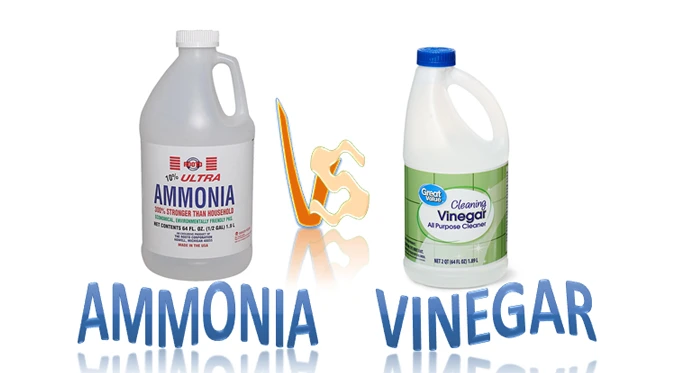Last Updated on March 11, 2023
There are many debates about which household cleaner is better: ammonia vs vinegar. Both have their own unique benefits and drawbacks, but it ultimately depends on the specific cleaning task at hand.
This article will explore the pros and cons of ammonia and vinegar to help you decide which is better for your cleaning needs.
What is Ammonia, And How Does It Work?
Ammonia is a powerful cleaning agent made up of nitrogen and hydrogen. When ammonia comes into contact with warm water, it forms a weak acid called ammonium hydroxide. This acid helps remove dirt, grease, and grime from surfaces.
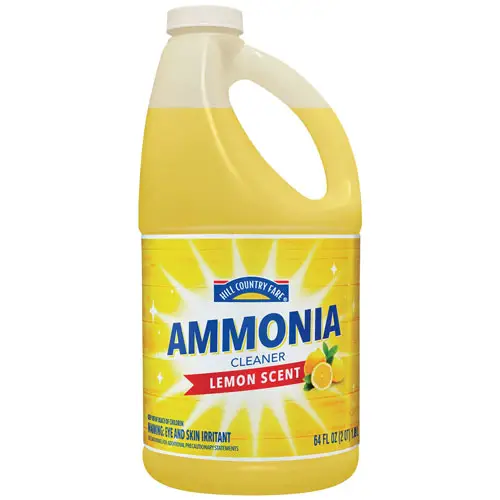
Ammonia is also a disinfectant, which can kill bacteria and viruses. For this reason, it is often used to clean surfaces that may be contaminated.
What is Vinegar, And How Does It Work?
Vinegar is a weak acid made up of water and acetic acid. When vinegar comes into contact with dirt, grease, or grime, it forms a strongly alkaline solution. This alkaline solution helps to break down the dirt, grease, or grime and lift it from the surface.
Like ammonia, vinegar is also a disinfectant. It can kill bacteria and viruses on contact.
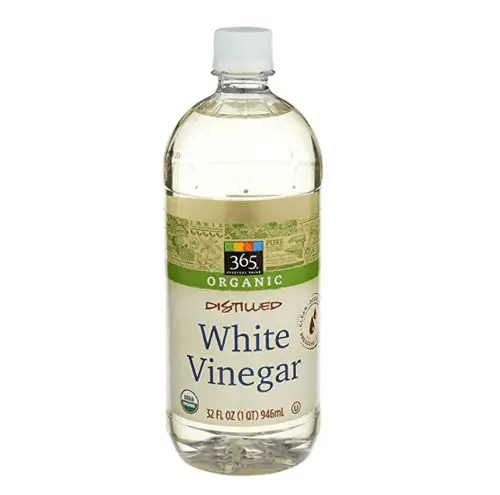
Ammonia vs Vinegar: What’s The Difference?
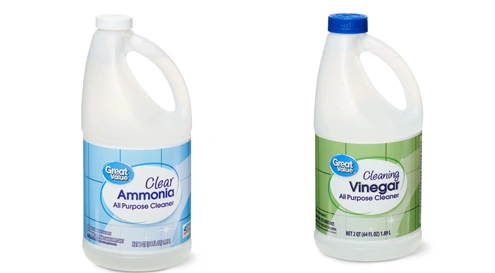
There are a lot of differences between Ammonia and Vinegar. Let’s take a look at some of the key ones:
1. Type:
Ammonia is a gas, while vinegar is a liquid. These two substances react differently when they are mixed with water.
2. Strength:
Ammonia is a much stronger cleaner than vinegar. It is able to remove tougher dirt, grease, and grime. Vinegar is not as powerful and may not be suitable for some cleaning tasks such as a glass cleaner.
3. Safety:
Ammonia is a hazardous substance and can be harmful if it is not used correctly. Vinegar is non-toxic and safe to use around pets and children.
4. Smell:
Ammonia has a strong ammonia smell, while vinegar has a vinegary smell. Some people may find the ammonia smell unpleasant, while others may find the vinegar smell offensive.
5. Abrasiveness:
Ammonia is a highly abrasive cleaner and can damage surfaces if not used properly. Vinegar is less abrasive and is less likely to damage surfaces.
6. Environmental Impact:
Ammonia is a greenhouse chlorine gas and contributes to climate change. White vinegar does not have any negative environmental impacts.
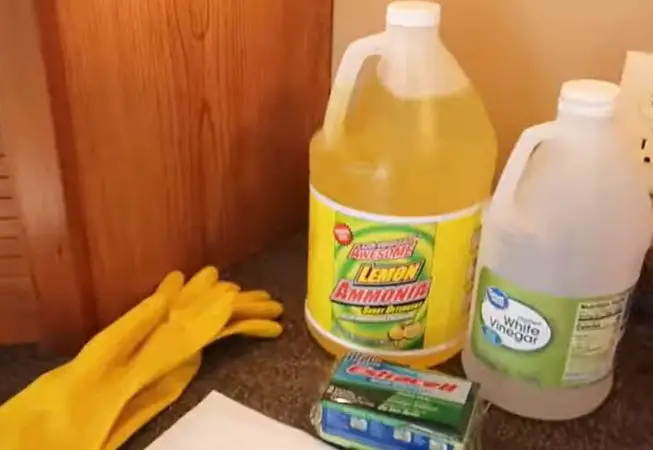
7. Effectiveness:
Ammonia and vinegar are both effective cleaners. However, ammonia is more effective for some cleaning tasks, while vinegar is more effective for others.
8. Versatility:
Ammonia is a versatile cleaner and can be used for a variety of tasks. Vinegar is less versatile and is not as effective for some tasks.
9. Ease of Use:
Ammonia is more difficult to use than vinegar. It needs to be mixed with water in a specific ratio, and it can be dangerous if not used properly. Vinegar is easy to use and does not require any special preparation.
10. Availability:
Ammonia is not widely available and can be difficult to find. Vinegar is readily available at most grocery stores.
Pros and Cons of Each
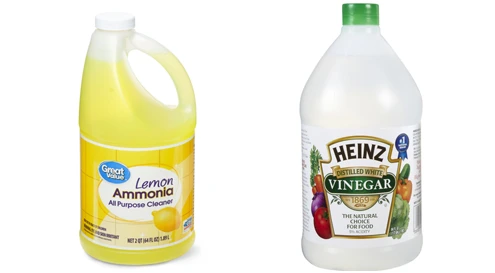
We have now examined the key differences between ammonia and vinegar. Let’s now examine the pros and cons of each:
Ammonia Pros:
- Ammonia is a powerful cleaner that can remove dirt, grease, and grime.
- Ammonia is a disinfectant and can kill bacteria and viruses.
- Ammonia is a versatile cleaner and can be used for various tasks.
Ammonia Cons:
- Ammonia is a hazardous substance and can be harmful if not used properly.
- Ammonia has a strong ammonia smell that some people may find unpleasant.
- Ammonia or bleach is a highly abrasive cleaner and can damage surfaces if not used properly.
Vinegar Pros:
- Vinegar is a weak acid that effectively breaks down dirt, grease, and grime.
- Vinegar is non-toxic and safe to use around pets and children.
- Vinegar does not have any adverse environmental impacts.
- Vinegar is easy to use and does not require any special preparation.
- Vinegar can be used as a baking soda substitute.
Vinegar Cons:
- Vinegar is not as powerful as ammonia and may not be suitable for some cleaning tasks.
- Vinegar has a vinegary smell that some people may find offensive.
- Vinegar is less versatile than ammonia and is not as effective for some tasks.
- Vinegar is more challenging to use than ammonia. It needs to be mixed with hot water in a specific ratio, and it can be dangerous if not used properly.
- Vinegar is not as widely available as ammonia. It can be challenging to find in some areas.
Which One Should You Use and Why?
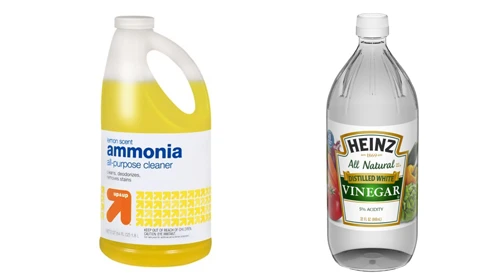
Now that we have looked at the pros and cons of ammonia and vinegar, it is up to you to decide which one is the best cleaning product for you. Both of these cleaners are effective and have their unique benefits.
Ammonia is more powerful and is better suited for challenging cleaning tasks, while vinegar is less powerful but safer to use around pets and children. If you are unsure which one to use, it is best to start with vinegar and see if it is adequate for the task at hand. If it is not, then you can try using ammonia.
Which is Better for What Type of Cleaning Task?
Now that we have looked at the pros and cons of ammonia and vinegar. Let’s take a look at which one is better for what type of cleaning task:
Ammonia is Best for:
- Removing dirt, grease, and grime
- Killing bacteria and viruses
- Cleaning tough surfaces
- Drain cleaner
Vinegar is Best for:
- Removing light dirt, grease, and grime
- Cleaning non-touch surfaces
- Neutralizing odors
- Softening water
- Cleaning windows
FAQs
Can I Substitute Vinegar for Ammonia?
White vinegar is not as powerful as ammonia; it can be used as a substitute in some cases. If you are cleaning a non-touch surface and you do not have ammonia available, vinegar can be a good alternative.
Is Vinegar Safe to Use Around Pets and Children?
Yes, vinegar is safe to use around pets and children. It is non-toxic and does not have any negative environmental impacts.
Does Vinegar Have a Strong Smell?
Yes, vinegar has a vinegary smell that some people may find offensive.
What Do Vinegar and Ammonia Make?
When vinegar and ammonia are mixed, they create a corrosive substance that can be harmful if not used properly.
Conclusion
Both ammonia and vinegar are effective cleaners that have their unique benefits. Ammonia is more powerful and better suited for challenging cleaning tasks, while apple cider vinegar is less powerful but safer to use around pets and children.
If you are unsure which one to use, it is best to start with vinegar and see if it is adequate for the task at hand. If it is not, then you can try using ammonia.

